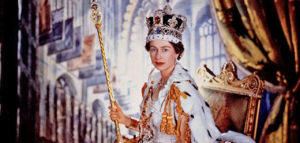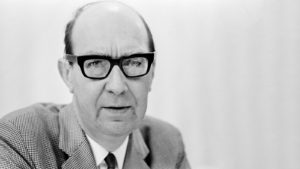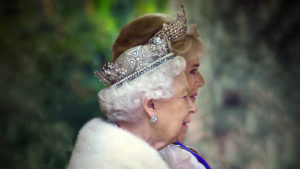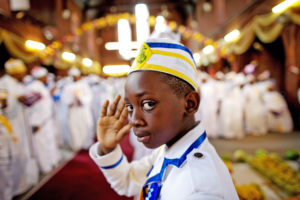“Racism was outlawed in England in the 60s & it’s been allowed to thrive so why should black & brown mourn!! #queen”, tweeted — and then deleted — the former footballer Trevor Sinclair. An associate professor at Carnegie Mellon University, Uju Anya, wished a painful death on Her Majesty and described the Queen as “the chief monarch of a thieving and raping genocidal empire”. And Karen Attiah in the Washington Post claims that “we must get back to work — to dismantle the present-day vestiges of the racist, colonial empire she [the Queen] so dutifully represented.”
While most of us have spent the week praising the life and legacy of Queen Elizabeth II, she has been denounced by those who claim to speak on behalf of truth and justice. She wasn’t a benign monarch, these people say. She sponsored a system of racist division, and any black or brown person who mourns her death is a stooge of Empire and white supremacy. A House Negro. Self-hating. A coon.
It is indisputable that the British Empire committed many atrocities, and many of its advocates were motivated by racism. But the idea that Queen Elizabeth II’s international legacy can be reduced to colonial oppression and violence is a perverse distortion of history. When many West Indians moved to Britain in the Fifties and Sixties, their claim to a British identity and equal status with native white Britons was on the basis of being subjects of the Crown. Should they have rejected this? Is any black or brown person who accepts a knighthood a traitor to his race? Are all those nations where they are now flying flags at half-mast — from India to Nigeria to Jamaica to Ghana to Trinidad and many, many more — governed by self-hating coons? Every single one of them? Were all the postcolonial leaders who either decided to stay in the Commonwealth or join it motivated by profound self-loathing? This is not just an offensive argument: it’s patently absurd.
Rather than being a symbol of white supremacy, Queen Elizabeth II devoted much of her reign to fostering amicable relations with those countries which used to be a part of the British Empire. In April 1947, Princess Elizabeth spent the afternoon of her 21st birthday recording a filmed message to “all the peoples of the British Commonwealth Empire, wherever they live, whatever race they come from, and whatever language they speak”. Elizabeth calmly outlined her dedication to the colonies and countries that linked through Britain like a daisy-chain across the world: “I declare before you all that my whole life, whether it be long or short, shall be devoted to your service and to the service of our great imperial family to which we all belong.” It was a promise she would keep.
By the time of her coronation, in June 1953, the Commonwealth, which had emerged after decolonisation, only had eight countries. They wanted to rule themselves, but they didn’t want to completely sever their relationship with Britain. It would be tempting to describe the Commonwealth as Anglophone, a continuation of the countries Britain conquered and subjugated, and imposed their language and customs upon: the pink splash across old maps of the world. But this is a simplistic way of looking at this mosaic of nations.
The picture is a complex one. Canada is a majority English-speaking and minority French-speaking country; Cameroon is a majority French-speaking country and minority English-speaking country, colonised by the Germans before it was handed over to France. Both Canada and Cameroon are part of the Commonwealth. The official language of Mozambique is Portuguese — and when it joined the Commonwealth, in 1995, it became the first country to do so that was never a part of the British Empire. Togo and Gabon, two former French colonies, have joined the Commonwealth this year. They are the 55th and 56th members. It is a club that people want to join, not a union imposed by force.
If it’s not language, then what unites these nations? To a great extent, it was that quietly-spoken young woman, who, five years after giving that speech on her 21st birthday, became the Queen of Britain, and assumed the ceremonial position of managing the loss of an Empire. She didn’t bestride these newly independent countries like an aggrieved dictator. Nor was she a passive caretaker. She listened, and learned, and exercised her inquisitive mind. She was devoted to internationalism, and many nations warmed to those qualities. Elizabeth was the greatest diplomat of the 20th century.
Her diplomatic qualities were crucial in 1961. By that time, the Commonwealth had grown from eight to 12 members. That year, she would have to visit one small but profoundly consequential country in west Africa, and make sure it didn’t leave the club.
Ghana was the first black African country to gain independence, and it soon became the first African country to join the Commonwealth. The president was a charismatic firebrand called Kwame Nkrumah. He spent the Thirties studying sociology and economics in Pennsylvania, and selling fish on the streets of New York. After he moved to England, in 1945, he was often in Camden cafés chatting amiably with communists and anti-imperialists. When Nkrumah moved back to the Gold Coast, as Ghana was then known, and threatened the status quo by launching a mass strike, the governor-general Sir Charles Arden-Clarke described him as a “thoroughgoing communist”.
1961 was the white heat of the Cold War: five years after the crushing of the Hungarian uprising, and the year the Berlin Wall went up. Africa was decolonising, and many of these new nations were being courted by the Soviet Union. The Queen was scheduled to arrive in Ghana on 9 November 1961. The month before, Nkrumah had visited Moscow. Closer to Ghana, five days before her visit, a bomb exploded in the capital city of Accra which damaged a statue of Nkrumah.
The Queen was undaunted, telling Prime Minister Harold MacMillan: “I am not a film star. I am the head of the Commonwealth — and I am paid to face any risks that may be involved. Nor do I say this lightly. Do not forget that I have three children”.
The trip was a peach. She landed first in Accra and met several government ministers and dignitaries. These diplomatic endeavours were followed up by meetings with the chiefs and kings of Ghana. According to Nkrumah’s personal photographer, the Queen was genuinely interested in the people she met, asking incisive questions, for instance, about the cultural significance of native dress.
She was introduced to High Life music — a fusion of the native Akan musical rhythms and Jazz — and danced with Nkrumah. The revolutionary pan-Africanist leader, the chum of Nikita Khrushchev and Mao Zedong, danced happily with the Queen of Britain; the Commonwealth was a model of tolerance. (This, at a time when any black man who stared at a white woman for too long could be lynched in the United States.)
Ghana never left the Commonwealth. And by the Seventies, with revolutionary fervour ramping up across the developing world, the club had more than doubled its membership to nearly 30 nations.
If the legend of Elizabeth as the silent, passive doll Queen were true, the Commonwealth never would have worked. Her public inscrutability belied a deeply engaged person. Eugenia Charles, the Prime Minister of Dominica, and the so-called Iron Lady of the Caribbean in the Eighties, said of the Queen that, “it’s obvious that she’s not just talking pieties. She’s interested, definitely interested, in what is happening in each of those countries”.
The Queen of the Commonwealth was not the mute Queen of postage stamps. She was articulate, she argued, she cajoled. The former Prime Minister of Fiji, Kamisese Mara, put it like this: “If you don’t know what you’re talking about she’ll soon let you know that you’re not quite fully versed in what you’re talking about because she’s so knowledgeable.”
Shridath Ramphal, the former Commonwealth Secretary-General, knew this Queen, a version largely hidden from the rest of us: “Every prime minister, every president, and I’ve been up against some pretty radical ones, militant ones, ones that you might think probably don’t care too much for this all monarchical thing.” Even they, according to Ramphal, placed maximum importance “on those 15-20 minutes when they can sit down with the Queen and talk about their countries, their problems, because she knows them very well”.
Her ability to approach internecine conflict with wisdom and knowledge was never on greater display than in her attitude to the nation where she was staying on her 21st birthday: South Africa. A year after that speech, South Africa started introducing a series of laws that prohibited marriage between people of different races; forced people of certain races to live in certain areas; and reinforced and expanded all pre-existing discriminatory practices in the country. These laws institutionalised the inferior status of black people. The word Apartheid entered the lexicon.
In 1961, South Africa withdrew from the Commonwealth. The Afrikaner government saw the Queen as a symbol of British imperialism, and they wanted to be free to pursue their racist policies without hindrance. In 1986, Commonwealth leaders all decided, with the consent of the Queen, to impose economic sanctions on South Africa. The Queen later developed a strong relationship with Nelson Mandela. He called her Elizabeth, and she called him Nelson. He was the only non-royal to call her by her first name. In 1994, four years after Mandela was released from prison, and in the year of its first ever democratic and multiracial election, South Africa rejoined the Commonwealth.
The Queen’s decades of service within the Commonwealth display a more nuanced picture of the relationship between the British empire and the postcolonial world. This is a story that is about more than conflict. To have the Commonwealth — that legacy of the Empire — embraced by leaders who also embraced Frantz Fanon and Karl Marx illustrates the complexities of the post-colonial relationship to Britain. These leaders detested white supremacy and brutal economic exploitation. But they also loved the Queen. Through the dignity of her character, she transcended hateful divisions.
Many of these post-colonial leaders, like Nkrumah, later degenerated into corrupt and authoritarian despots. Others, like Mandela, are universally acclaimed. But for most of them the Queen was a genuinely popular figure. A source of unity rather than oppression. An embodiment of the greatest virtues in a divided world: curiosity, compassion, grace and knowledge.
King Charles may not possess exactly the same qualities as his mother, but he is the custodian of a magnificent legacy. Despite the fact Barbados removed the Queen as its head of state last year, it is still a part of the Commonwealth. And I predict many more countries will want to join. And despite the bitterness of parochial diaspora activists, we have this to console ourselves with: our head of state, for 70 years, was a unifying figurehead across the world.
Disclaimer
Some of the posts we share are controversial and we do not necessarily agree with them in the whole extend. Sometimes we agree with the content or part of it but we do not agree with the narration or language. Nevertheless we find them somehow interesting, valuable and/or informative or we share them, because we strongly believe in freedom of speech, free press and journalism. We strongly encourage you to have a critical approach to all the content, do your own research and analysis to build your own opinion.
We would be glad to have your feedback.
Source: UnHerd Read the original article here: https://unherd.com/





